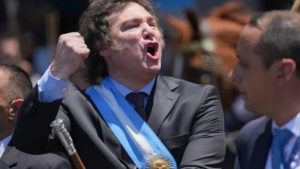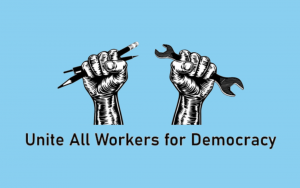The results of Argentina’s primary elections, held earlier this month, were a punishing blow to the governing Peronist coalition. While most analysts expected a serious challenge to the Peronists by the coalition of the traditional right-wing, Juntos Por El Cambio, few predicted that the far-right figure Javier Milei would come out ahead of both coalitions and seize over 30 percent of the vote. Juntos Por El Cambio placed second, giving the Right as a whole just under 60 percent, while the Peronists experienced one of their worst showings in a presidential election since the end of the dictatorship in the early ‘80s. To give just one example of their precipitous decline, the Peronists lost 6 million votes compared to 2019, when their presidential candidate Alberto Fernandez emerged as the victor.
The unexpected support for Milei has given the Far Right their best performance in decades and it represents a frontal attack on workers, women, the unemployed, Indigenous people, and other marginalized people. The election results were immediately celebrated by jailed leaders of Argentina’s military dictatorship, who see in the libertarian economist-turned-politician their best chance for freedom. Not without reason. Milei’s vice presidential pick, Victoria Villarruel is a staunch defender of the dictatorship, and denies its responsibility for the more than 30,000 people killed during its rule. Other reactionary sectors of Argentinian society are sure to take heart from after the primaries as well. Among the candidate’s most draconian proposals are the rollback of abortion rights; the elimination of the Ministry of Women, Gender, and Diversity; an end to publicly funded sex education in schools; and slashing public spending.
Since these were primary elections — Argentina’s primary system requires all party slates to compete on the same day — Milei’s success was somewhat symbolic. He will still have to defeat four other candidates in the general elections in October. And if no candidate secures an absolute majority, the top two candidates must compete in a runoff. In the event Milei reaches a two-candidate race, a substantial number of voters will see him as the “greater evil,” which makes the prospect of him winning the presidency still far from assured. Still, the results of the primaries demonstrate clearly the increasing strength of the Far Right in the country and the severe crisis facing the Peronists after just one term in office. The support for the government is so low that neither current president Alberto Fernandez, nor former president and current vice president Cristina Fernandez de Kirchner, considered it wise to represent their party this year. Instead, the coalition placed its bet on Sergio Massa, the current Economy Minister and the figure responsible for the government’s negotiations with the IMF.
Above all, the performance of Javier Milei expresses a widespread popular discontent with the establishment parties, and especially the Peronist government of Alberto Fernandez. Tellingly, the chant heard most loudly at Milei’s victory party was “Que se vayan todos, que no quede ni uno solo” — roughly, “Throw them all out, every single one,” the famous slogan of the rebellions of 2001, which forced five successive presidents to resign.
It is not difficult to understand why this discontent exists. Runaway inflation, the slide of the peso against the dollar, low wages, and high levels of precarity have drastically cut the living standards of tens of millions of Argentinians. Inflation stands at well over 100 percent, one of the highest rates in the world. The rise in the cost of living, which is well outpacing increases in wages, have meant poverty levels not seen in decades. The poverty rate now exceeds 40 percent, a four-fold increase since just 2018. Though employment is relatively high, nearly half of workers are now in the informal sector, and are therefore without union benefits, paid leave, or pensions. Meanwhile, the booming industries like lithium extraction and agribusiness are creating multimillion-dollar corporate profits, especially for foreign multinationals.
The Fernandez government showed a complete unwillingness to tackle the inflationary crisis. It took no measures to raise salaries for working people. It refused to implement meaningful and lasting price controls. And rather than increasing social spending to address the country’s soaring poverty, the government opted to pay off the debt to the IMF incurred by the previous administration of Mauricio Macri. Roughly $10 billion will go toward servicing the debt this year. Next year, the terms of the agreement demand the payment of over $20 billion. On the day after the primary elections, the Fernandez government announced a new devaluation of the peso, further undercutting the incomes of workers, middle-class people, and the poor.
The greatest contradiction of the current political situation is that a majority of voters, including a significant number of working-class and poor voters, chose candidates of the right wing, who will offer no solutions to the social crisis facing the country. Indeed, the Right — both the “moderate” figures and extreme figures like Milei — will only impose greater austerity and dutifully follow the dictates of the IMF. Milei himself affirmed this in a meeting with IMF officials this past week, “We will not default on either our debt to the IMF or our sovereign debt.”
How can we explain the fact that most voters chose to punish the Peronists by supporting the most reactionary candidates, who only put forward repackaged versions of the failed neoliberal economic strategies of the past?
To begin, Milei’s success cannot be understood within a purely national framework. Across the world, but particularly in Europe and the Americas, a wave of far-right figures has since the middle of the last decade capitalized on the rejection of what Nancy Fraser called “progressive neoliberalism.” As Fraser describes it, progressive neoliberalism encompassed policies that combined privatizations, cutbacks to social services, the offshoring of jobs, and attacks on unions with the promotion of “diversity” and new opportunities for a small elite from among traditionally oppressed sectors, like women, Black people, and LGBTQ people, to enter the corporate hierarchy.
For the vast majority, this agenda offered nothing but unprecedented levels of debt, precarity, and environmental degradation. And as more and more turned against progressive neoliberalism and its consequences, the parties of the establishment that promoted it faltered while new figures and parties of the populist right and left captured wide popular support. In particular, an “anti-globalist” right wing, represented by Brexit and figures like Donald Trump, proved skillful in attracting many of those left behind by progressive neoliberalism such as small business owners and layers of the capitalist class that could not compete in the new globalized order and workers who saw their jobs shipped abroad or else outsourced to a more “flexible” labor force domestically. Trump and others succeeded because they combined rabid attacks on the supposed beneficiaries of the new order like women, immigrants and LGBTQ people — though in reality, only a tiny fraction of these sectors benefited — with some measure of economic populism, like the (at least nominal) rejection of free trade agreements or the promise to bring well-paid jobs back to the country.
This reactionary wave reached the peripheral world too, especially South America, with the victory of Jair Bolsonaro in Brazil, and the near victories of Jorge Kast in Chile and Keiko Fujimori in Peru. But in the countries of the South, the Right had little room to challenge the institutions of global capitalism, like the IMF and World Bank. They relied on support from the core capitalist countries whose leaders demanded they continue servicing the foreign debt while keeping the country’s resources and labor force open to imperialist exploitation, just as their predecessors had done.
Far right leaders like Bolsonaro, therefore, restricted themselves to attacks on the so-called “establishment” and the progressive sectors of society: Black people, Indigenous people, and the poor and without any economic populist overtures. Milei, for his part, directs invectives against the politicians of the mainstream parties, whom he calls “the caste.” He has promised to shut down the Argentinian Central Bank. He plans to eliminate many social programs benefiting women, the poor and other traditionally excluded sectors. But he refuses to utter a word against the multinational corporations that plunder the country. He says nothing about addressing the poverty-level wages or the uberization of jobs that affect tens of millions of workers. And of course, he has promised to respect the debt to the IMF and foreign creditors. Surveys of Milei’s voters show that many do not agree with either his social or economic programs. Fewer than 30 percent of his voters agree with his plan to dollarize the economy. An even smaller number agree with his proposal to privatize the airlines. But his perceived challenge to “progressive neoliberalism” and the traditional political parties is enough to win him the support of wide sectors.
A final aspect which we must highlight in order to understand the country’s shift to the right is the role played by the union leadership and the social movements in containing social struggles. Throughout the nearly four years of Fernandez’s government, the unions have failed to organize national actions against the cost of living increases, or the cutbacks and fee hikes imposed by the government. Struggles against the government’s austerity program could have radicalized the working class, women and youth and led them to anticapitalist conclusions. Instead, confusion, despair and resignation took hold among many in these sectors. As a consequence, millions abstained from voting or voted Milei as a punishment to those responsible for the economic situation.
However, Argentina’s workers and youth do not need to choose between the candidates of the center, Right, or Far Right, who all defend the interests of the biggest corporations and pledge to pay off the IMF at the cost of driving down the living standards of the majority. The Workers Left Front, an electoral coalition of four Trotskyist parties, is the one option on the ballot that offers a program to confront the social and economic crises, including the reduction of the working day, a major public works program, the prohibition of layoffs, and the nationalization of strategic sectors of the economy. In various cities and provinces of the country, the Left Front demonstrated that it is a formidable electoral force and capable of amplifying the struggles of the working class and progressive sectors. In the province of Jujuy, where Indigenous people and teachers led major social struggles earlier this year, the Left Front earned 10 percent of the vote.
Following the primaries earlier this month, the presidential candidate of the Left Front in the October general elections will be Myriam Bregman, socialist feminist, human rights lawyer, and member of the Party of Socialist Workers (or PTS). As Bregman says, “despite their rhetorical differences, [all the candidates of big business] share a program based on austerity, wage cuts, and extractivism. As we saw with the presidencies of Donald Trump or Jair Bolsonaro, the far right, so-called “outsider” candidates, offer a lot of bluster around taking down the “establishment” but present no real threat to the corporate and financial elite, those who are truly responsible for the crises faced by the Argentinian people.











